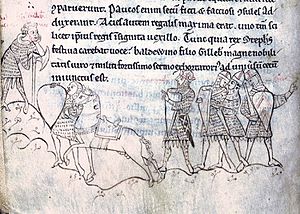Battle of Lincoln (1141)
| Battle of Lincoln | |||||||
|---|---|---|---|---|---|---|---|
| Part of The Anarchy | |||||||
 Battle of Lincoln in Historia Anglorum |
|||||||
|
|||||||
| Belligerents | |||||||
| Blesevins | Angevins | ||||||
| Commanders and leaders | |||||||
| Stephen of Blois (POW) | Robert of Gloucester | ||||||
| Strength | |||||||
| 1,250 men | 1,000 men | ||||||
| Casualties and losses | |||||||
| Unknown King Stephen captured |
Unknown | ||||||
The Battle of Lincoln, or the First Battle of Lincoln, occurred on 2 February 1141 between King Stephen of England and forces loyal to Empress Matilda. Stephen was captured during the battle, imprisoned, and effectively deposed while Matilda ruled for a short time.
The forces of King Stephen of England had been besieging Lincoln Castle but were themselves attacked by a relief force loyal to Empress Matilda and commanded by Robert, 1st Earl of Gloucester, Matilda's half-brother. The Angevin army consisted of the divisions of Robert's men, those of Ranulf, Earl of Chester and those disinherited by Stephen, while on the flank was a mass of Welsh troops led by Madog ap Maredudd, Lord of Powys, and Cadwaladr ap Gruffydd. Cadwaladr was the brother of Owain, Prince of Gwynedd, but Owain did not support any side in The Anarchy. Stephen’s force included William of Ypres; Simon of Senlis; Gilbert of Hertford; William of Aumale, Alan of Richmond and Hugh Bigod but was markedly short of cavalry.
As soon as the battle was joined, the majority of the leading magnates fled the king. Other important magnates captured with the king were Baldwin fitz Gilbert; Bernard de Balliol, Roger de Mowbray; Richard de Courcy; William Peverel of Nottingham; Gilbert de Gant; Ingelram de Say; Ilbert de Lacy and Richard fitzUrse, all men of respected baronial families; it had only been the Earls who had fled.
...
Wikipedia
